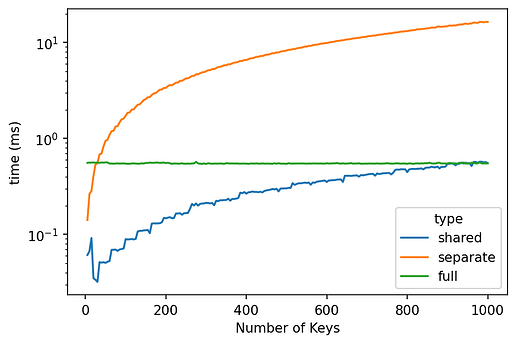Hi, thanks for the answer @eqy!
I’ve tried to see if the issue was related by running additional experiments on the CPU to compare with the two suggested improvements.
From the following code, I believe we can conclude the issue isn’t related.
b, h, q, k, d = 8, 1, 1000, 100, 32
test_mat = torch.normal(0, 1, (b, h, q, d))
test_mat_u = test_mat.unsqueeze(-2) # (b, h, q, 1 ,d)
test_mat_q_k = test_mat_u.permute(0,1,3,2,4)[...,:k,:].tile((1, 1, q, 1, 1)) # (b, h, q, k, d)
test_mat_k = test_mat[...,:k,:] # (b, h, k, d)
print('### SEPERATE KEYS ###')
print("\n Timing contract('bhqd,bhqkd->bhqk', test_mat, test_mat_q_k, backend='torch') : 25.6M FLOPs")
%timeit contract("bhqd,bhqkd->bhqk", test_mat, test_mat_q_k, backend='torch')
print("\n Timing torch.einsum('bhqd,bhqkd->bhqk', test_mat, test_mat_q_k) : 25.6M FLOPs")
%timeit torch.einsum("bhqd,bhqkd->bhqk", test_mat, test_mat_q_k)
print("\n Timing np.einsum('bhqd,bhqkd->bhqk', test_mat.numpy(), test_mat_q_k.numpy()) : 25.6M FLOPs")
%timeit np.einsum("bhqd,bhqkd->bhqk", test_mat.numpy(), test_mat_q_k.numpy(), optimize='optimal')
print("\n Timing torch.matmul(test_mat_u, test_mat_q_k.transpose(-2,-1)).view(b,h,q,k) : 25.6M FLOPs")
%timeit torch.matmul(test_mat_u, test_mat_q_k.transpose(-2,-1)).view(b,h,q,k)
print('\n ### SHARED KEYS ###')
print("\n Timing contract('bhqd,bhkd->bhqk', test_mat, test_mat_k, backend='torch') : 25.6M FLOPs")
%timeit contract("bhqd,bhkd->bhqk", test_mat, test_mat_k, backend='torch')
print("\n Timing torch.einsum('bhqd,bhkd->bhqk', test_mat, test_mat_k) : 25.6M FLOPs")
%timeit torch.einsum("bhqd,bhkd->bhqk", test_mat, test_mat_k)
print("\n Timing np.einsum('bhqd,bhkd->bhqk', test_mat.numpy(), test_mat_k.numpy()) : 25.6M FLOPs")
%timeit np.einsum("bhqd,bhkd->bhqk", test_mat.numpy(), test_mat_k.numpy(), optimize='optimal')
print("\n Timing torch.matmul(test_mat, test_mat_k.transpose(-2,-1)).view(b,h,q,k) : 25.6M FLOPs")
%timeit torch.matmul(test_mat, test_mat_k.transpose(-2,-1)).view(b,h,q,k)
print('\n ### ALL KEYS ###')
print("\n Timing torch.einsum('bhqd,bhkd->bhqk', test_mat, test_mat) : 256M FLOPs")
%timeit torch.einsum("bhqd,bhkd->bhqk", test_mat, test_mat)
It returns:
### SEPERATE KEYS ###
Timing contract('bhqd,bhqkd->bhqk', test_mat, test_mat_q_k, backend='torch') : 25.6M FLOPs
100 loops, best of 5: 16.4 ms per loop
Timing torch.einsum('bhqd,bhqkd->bhqk', test_mat, test_mat_q_k) : 25.6M FLOPs
100 loops, best of 5: 12.5 ms per loop
Timing np.einsum('bhqd,bhqkd->bhqk', test_mat.numpy(), test_mat_q_k.numpy()) : 25.6M FLOPs
100 loops, best of 5: 11.8 ms per loop
Timing torch.matmul(test_mat_u, test_mat_q_k.transpose(-2,-1)).view(b,h,q,k) : 25.6M FLOPs
100 loops, best of 5: 12.4 ms per loop
### SHARED KEYS ###
Timing contract('bhqd,bhkd->bhqk', test_mat, test_mat_k, backend='torch') : 25.6M FLOPs
1000 loops, best of 5: 1.34 ms per loop
Timing torch.einsum('bhqd,bhkd->bhqk', test_mat, test_mat_k) : 25.6M FLOPs
1000 loops, best of 5: 1.27 ms per loop
Timing np.einsum('bhqd,bhkd->bhqk', test_mat.numpy(), test_mat_k.numpy()) : 25.6M FLOPs
100 loops, best of 5: 13 ms per loop
Timing torch.matmul(test_mat, test_mat_k.transpose(-2,-1)).view(b,h,q,k) : 25.6M FLOPs
1000 loops, best of 5: 1.27 ms per loop
### ALL KEYS ###
Timing torch.einsum('bhqd,bhkd->bhqk', test_mat, test_mat) : 256M FLOPs
100 loops, best of 5: 10.6 ms per loop
For a better contraction path, opt_einsum now supports torch. However, as shown above, using opt_einsum.contract doesn’t improve over torch.einsum.
For the second suggestion on discontiguous cases, I directly compared to np.einsum as it’s supposed t be handled in numpy. Unfortunately, similarly np.einsum doesn’t handle the additional dimension better. Moreover, np.einsum seems to implement the “shared” cases as the separate resulting in a similar run-time ( see above ).
If those two suggestions from the issue you gave seem to be a possible improvement for torch.einsum, this example seems to fall under neither specific case. Moreover, the issue seems to come from torch.matmul itself as it does show the same pattern in runtime, even though the FLOPs are similar between “shared” and “separate” keys cases.
